Home
Chapter 1
As White As Snow Seven hundred years before the birth of Christ, a man by the name of Isaiah bridged the gap between the seen and the unseen worlds when he spoke for God to the people of Judah. The vision of Isaiah the son of Amoz, which he saw concerning Judah and Jerusalem in the days of Uzziah, Jotham, Ahaz, and Hezekiah, kings of Judah. The name "Isaiah" means "Yahweh is salvation" (or, alternatively, "Jehovah is salvation" or "God is salvation").
To the Israelite people, names were important. To us, they are just a label with which to identify people. To the Israelite people, they represented much more. In the first chapter of Isaiah, there are two names or titles for God that are characteristic of the book of Isaiah.
In verse nine we see the name "Lord of Hosts". The New International Version has "Lord Almighty". A more literal rendering would be "Lord Sabaoth", which you may recognize from the hymn "A Mighty Fortress Is Our God". ("Lord Sabaoth his name; from age to age the same; and he must win the battle.") A lot of people, when singing that song, assume that "Lord Sabaoth" means "Lord of the Sabbath"; but "Sabaoth" is a Hebrew word that means "hosts" or "armies". The "hosts" probably refer to the hosts or armies of Heaven. The song "Whom Shall I Fear", performed by Chris Tomlin, captures the essence of the name with the subtitle "God of Angel Armies".
Isaiah lived in a time in which the Assyrian Empire, the greatest empire that the world had ever seen, had conquered most of the Near East.
It would soon take the northern kingdom of Israel into captivity, conquer all of the outlying cities of Judah, and eventually camp outside the
walls of Jerusalem demanding its capitulation. In the very near future, it would extend its realm even more, conquering even mighty Egypt and
extending its territory into the heart of the upper part of the African continent. With this as an ever-pressing background, Isaiah reminded the
people, and reminds us, that there is One who is greater and more powerful than even the king of Assyria. It is with this backdrop in mind that the name
"Lord of Hosts" is found 56 times in the book of Isaiah. In verse four we see what is probably the characteristic name for God in the book of Isaiah: "the Holy One of Israel". Although not found as often
as the title "Lord of Hosts", the phrase "the Holy One of Israel" is particularly characteristic of the writings of Isaiah. It appears twenty-nine times in the book of Isaiah and only
six other times in the rest of the Bible--and one of these six is spoken by Isaiah (II Kings 19:22). In addition, the similar name "the Holy One of Jacob"
is found once, and the simpler name "the Holy One" is found an additional four times. Isaiah's message is that, in times of great disappointment and wickedness, it is important to know
that there is one--"the Holy One"--who can be depended upon, who is completely and entirely good and righteous and unstained by the evils that man might encounter. It is a message both
for those in his day and for us today. You might not always be able to depend upon man, but you can always depend upon God.
In verse five, there is a word that can easily be missed or glossed over: the word "heart". "Heart" is a key word in much of prophetic literature; God has always been concerned with the heart of man.
This can also be seen elsewhere in the chapter in verses 11 through 17. Although the word "heart" is not used, the principle is easily seen. External religion isn't enough. God also wants the heart of man. That isn't to say that the externals aren't important. They definitely are. It is a concept that is well attested in many places in the Bible. If God took the trouble to give us guidelines regarding the externals of religion, he obviously wants us to respect them and to be dedicated in following them. But external religion alone will not suffice. God is especially concerned with the heart. The last chapter of the book of Isaiah has a similar thought:
Verse 17 of the first chapter of Isaiah ("...seek justice, correct oppression, defend the fatherless, plead for the
widow.") summarizes a key theme in prophetic literature--that God cares deeply about the poor and the oppressed. The
book of Amos is the touchstone for this theme, but most of the prophets refer to this same theme. Amos makes the case that it was
the oppression of the poor that was the primary reason that the northern kingdom of Israel was taken into captivity
never to return as a separate political entity. There were other factors: Blatant and flagrant immorality was one.
Idolatry and corrupt worship was another. But Amos makes the case that the northern kingdom was destroyed by God because
they did something even worse in God's eyes: They oppressed the poor. And in verse 17 of chapter one of Isaiah, early in his
prophecy, Isaiah stresses God's concern for the poor and oppressed.
Back in verse 15 we have something else worth noting:
When you spread forth your hands, God requires repentance--a change of heart. Man should not come to God expecting
forgiveness while at the same time determining that he will continue to oppress the poor, cheat the gullible, murder the innocent, and live lives of flagrant immorality. God expects a change of heart.
Isaiah lived during an evil time. We live in increasingly evil times ourselves. You've probably heard of a lot of situations in the news about people committing terrible atrocities. John Wayne Gacy (also known as The Killer Clown) killed at least 33 people over several years, many of whom he tortured first. After his arrest, Gacy remained uncaring and unrepentant until the day of his execution. Over approximately twelve years Robert Hansen kidnapped, assaulted, and killed 17 women around Anchorage, Alaska. For many of them, after he assaulted them, he would turn them loose in the Alaskan wilderness and then hunt them down and shoot them. The perverse brutality inflicted upon Channon Christian and Christopher Newsom in a Knoxville, Tennessee hijacking, kidnapping, and murder was so horrific that detailed descriptions, and usually even the crime itself, were left out of most news coverages.
In horrible cases like these, the people who commit the crimes usually don't have any overwhelming remorse. Most have little if any concern for those that they harmed, much less actually want to turn their lives around. But if they did want to turn their lives around, if they were looking for forgiveness, where would they turn? To whom would they go?
Some of the most heinous crimes in recent history were the ones involving Jeffrey Dahmer. If you don't know the name Jeffrey Dahmer, he killed at least seventeen people, probably more. To some of them, while they were drugged but still alive, he would drill a hole into their skull and inject hydrochloric acid into their brain. After his victims died, he would have sex with them,...and then he would eat them. Jeffrey Dahmer was one of the worst of the worst. But unlike so many others, Jeffrey Dahmer sought to turn his life around, at least in part because of the influence of a Church of Christ preacher involved in a jail ministry. But if you're Jeffrey Dahmer, where do you turn? To whom do you go? To you? To me? Be honest.
How many of us would have liked to have had Jeffrey Dahmer as a next door neighbor? If he tried to befriend one of us, would we be willing to take him up on his offer, knowing that his last friend eventually became his breakfast?
But what about those who do have that change of heart? Can they find redemption and forgiveness? That brings us to one of my favorite verses in Isaiah:
"Come now, let us reason together, says the LORD: If you look through the pages of the Bible, and wonder who was the most evil person in the Bible, you might come up with a name like Queen Jezebel, who, among many other evil deeds, had people bring false charges against a man named Naboth so that he was stoned to death. She did this so that she could gain possession of the vineyard of his family, a vineyard that he would not sell to her. Few people today name their children Jezebel.
Or you might come up with Judas Iscariot, who betrayed the Lord of Glory for thirty pieces of silver. Few people name their child Judas Iscariot.
The lives of both Jezebel and Judas Iscariot came to a bad end.
The most momentous crime in all the Bible was the killing of the Son of God. In the second chapter of the book of Acts, the Apostle Peter preaches to the gathered crowd, some of whom helped put Jesus on the cross. As Peter preaches that first gospel sermon after the death, burial, and resurrection of Christ, he recaps the Messianic prophecies and the events of recent days, and he concludes by saying:
"Let all the house of Israel therefore know assuredly that God has made him both Lord and Christ, this Jesus whom you crucified." For those there, a crime of that magnitude just isn't adequately covered by saying, "Whoops. Sorry."
The Bible says that those there were "cut to the heart" and asked "...what shall we do?" After all, when you have committed the greatest crime in the history of the world, is there still any hope? Is there any redemption?
Peter answered,
"Repent and be baptized, every one of you, in the name of Jesus Christ for the forgiveness of your sins, and you will receive the gift of the Holy Spirit."
I think that it is important that he said "every one of you". In 1861 the Baptist preacher Charles Spurgeon preached a sermon called "Addressed to Sinners of the Deepest Dye" with the word "Dye" referring to coloring, as in the dyeing of a fabric. In other words, these were people with the worst possible stains in their lives. In that sermon, referring to Peter in Acts chapter two, Spurgeon said this:
"Repent and be baptized, every one of you," said Peter. As John Bunyan puts it--one man might have stood in the crowd and said, "But I helped to hound him to the cross!" "Repent and be baptized, every one of you." "But I drove the nails into his hands!" one says. "Every one of you," says Peter. "But I pierced his side!" said another. "Every one of you," said Peter. "And I put my tongue into my cheek and stared at his nakedness and said, 'If he is the Son of God, let him come down from the cross!'" "Every one of you", said Peter. "Repent and be baptized, every one of you."
Forgiveness was offered by God to each and every one of them. ...though your sins are like scarlet, they shall be as white as snow...
The most heinous crime in the Bible,...but perhaps that's different from the most evil person in the Bible. If you are looking for the most evil person in the Bible, it would be hard to find a more likely nominee than King Manasseh of Judah.
Moreover Manasseh shed innocent blood very much, until he had filled Jerusalem from one end to another... He was a very wicked man.
In the first verse of chapter one of Isaiah, the kings are listed in whose reigns Isaiah's prophecies occurred. One whose name isn't mentioned is King Manasseh. Yet he was the son of the last king named there, King Hezekiah. Undoubtedly, as prince in waiting, he knew not only of Isaiah but of his prophecies. According to Jewish tradition, the prophet Isaiah met his death later in life at the hands of Manasseh, who according to tradition put Isaiah to death by sawing him into four pieces.
Manasseh was a very evil man.
And he did what was evil in the sight of the LORD, according to the despicable practices of the nations whom the LORD drove out before the people of Israel. For he rebuilt the high places that Hezekiah his father had destroyed, and he erected altars for Baal and made an Asherah, as Ahab king of Israel had done, and worshiped all the host of heaven and served them. And he built altars in the house of the LORD, of which the LORD had said, "In Jerusalem will I put my name." And he built altars for all the host of heaven in the two courts of the house of the LORD. And he burned his son as an offering and used fortune-telling and omens and dealt with mediums and with necromancers. He did much evil in the sight of the LORD, provoking him to anger. And the carved image of Asherah that he had made he set in the house of which the LORD said to David and to Solomon his son, "In this house, and in Jerusalem, which I have chosen out of all the tribes of Israel, I will put my name forever. And I will not cause the feet of Israel to wander anymore out of the land that I gave to their fathers, if only they will be careful to do according to all that I have commanded them, and according to all the Law that my servant Moses commanded them." But they did not listen, and Manasseh led them astray to do more evil than the nations had done whom the LORD destroyed before the people of Israel. So, in addition to the widespread shedding of innocent blood, Manasseh reinstituted idol worship throughout the land, including setting up altars to foreign gods within the Temple itself. He even burned his own children alive as an offering to the Ammonite god Molech.
The Bible says that,
The LORD spoke to Manasseh and to his people, but they paid no attention. The Bible attributes the later destruction of Jerusalem and its conquest by the Babylonians over a half century after Manasseh's death to God's anger over the sins of Manasseh.
"Because Manasseh king of Judah has committed these abominations and has done things more evil than all that the Amorites did, who were before him, and has made Judah also to sin with his idols, therefore thus says the LORD, the God of Israel: Behold, I am bringing upon Jerusalem and Judah such disaster that the ears of everyone who hears of it will tingle."
Manasseh was a very evil man.
Compare the wicked Manasseh with his righteous grandson, Josiah: During Josiah's day, a copy of Scripture was found in the Temple. Josiah called the people together, and he read the words of God to the people. He made a covenant before God that day to keep his commandments. Josiah essentially banned idol worship from the land and, in the presence of the priests of the false gods, destroyed all the idols that were found, along with their altars. He put away all the soothsayers and wizards and priests to false gods; and he commanded the observance of the Passover, which, with the exception of a much lesser and more limited observance during the time of Hezekiah, hadn't been done for about 400 years.
But long after the death of Manasseh, even during the height of the reforms instituted by the godly king, Josiah, the Bible says:
Nevertheless, the LORD did not turn away from the fury of His burning anger, which was kindled against Judah because of all that Manasseh had done to provoke Him to anger. Manasseh was a wicked, wicked man.
When speaking of the much later conquest by the Babylonians, their destruction of Jerusalem, and their taking of the people into captivity, the Bible says:
In his days Nebuchadnezzar king of Babylon came up, and Jehoiakim became his servant three years. Then he turned and rebelled against him. The LORD sent against him bands of the Chaldeans, bands of the Syrians, bands of the Moabites, and bands of the children of Ammon, and sent them against Judah to destroy it, according to the LORD's word which he spoke by his servants the prophets. Surely at the commandment of the LORD this came on Judah, to remove them out of his sight for the sins of Manasseh, according to all that he did, and also for the innocent blood that he shed; for he filled Jerusalem with innocent blood, and the LORD would not pardon.
In the book of Jeremiah, near the time of the Babylonian captivity, God says to Jeremiah:
"I will make them a horror to all the kingdoms of the earth because of what Manasseh son of Hezekiah king of Judah did in Jerusalem." In the Old Testament, well before Manasseh, the Biblical record sometimes speaks of increasingly evil kings or people as having done more evil than all who came before them.
Of Jeroboam: "You have done more evil than all who came before you...." Of the people of Rehoboam's day: And Judah did what was evil in the sight of the LORD, and they provoked him to jealousy with their sins that
they committed, more than all that their fathers had done. Of Omri: Omri did what was evil in the sight of the LORD, and did more evil than all who were before him. Of Ahab: However, Ahab son of Omri did evil in the sight of the LORD, more than all who were before him.. It perhaps is significant that there are no similar pronouncements after the time of Manasseh. No, not after Manasseh. Of no later ruler would it be said that they were worse than Manasseh, who apparently was the most evil of all, the worst of the worst.
In II Kings 21, we read:
"Because Manasseh king of Judah has committed these abominations and has done things more evil than all that the Amorites did, who were before him..." Forget about comparing Manasseh to previous kings of Israel or Judah. Instead of comparing Manasseh to them, God compares him to the Amorites, and says that he has done worse even than they did.
In that same chapter, we read:
...Manasseh lead them astray to do more evil than the nations had done whom the LORD destroyed before the people of Israel. No comparison would be made to prior kings of God's people--even to the worst of them--for Manasseh was more evil than any of them. He even did worse than the Amorites, and even more evil than any of the other nations.
He was the worst of the worst--perhaps the most evil person recorded in all of the Bible.
But that isn't the end of the story. In II Chronicles 33 we read this:
(Isaiah 1:1-18)
(Isaiah 1:1)
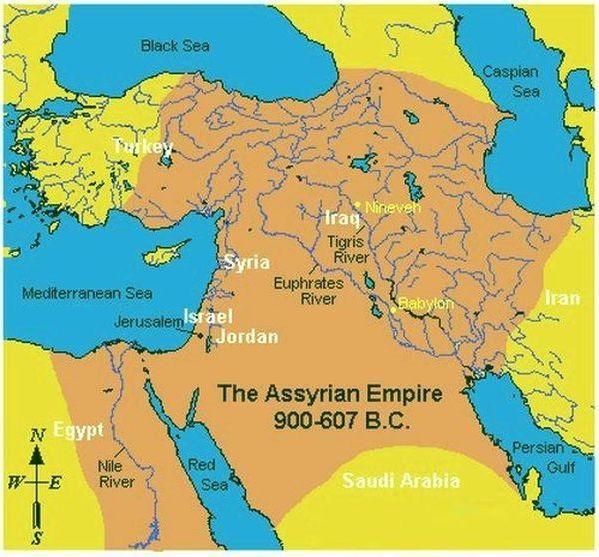
(Credit: globalhistorycullen [Wikispaces]; BY-SA 3.0 Creative Commons License)
says the LORD;
I have had enough of burnt offerings of rams
and the fat of fed beasts;
I do not delight in the blood of bulls,
or of lambs, or of he goats.
who requires of you
this trampling of my courts?
Bring no more vain offerings;
incense is an abomination to me.
New moon and sabbath and the calling of assemblies --
I cannot endure iniquity and solemn assembly.
Your new moons and your appointed feasts
my soul hates;
they have become a burden to me,
I am weary of bearing them.
When you spread forth your hands,
I will hide my eyes from you;
even though you make many prayers,
I will not listen;
your hands are full of blood.
Wash yourselves; make yourselves clean;
remove the evil of your doings
from before my eyes;
cease to do evil,
learn to do good;
seek justice,
correct oppression;
defend the fatherless,
plead for the widow."
(Isaiah 1:11-17 [RSV])
and the earth is my footstool;
what is the house which you would build for me,
and what is the place of my rest?
All these things my hand has made,
and so all these things are mine, says the LORD.
But this is the man to whom I will look,
he that is humble and contrite in spirit,
and trembles at my word."
(Isaiah 66:1-2 [RSV])
I will hide my eyes from you;
even though you make many prayers,
I will not listen;
your hands are full of blood.
though your sins are like scarlet,
they shall be as white as snow;
though they are red like crimson,
they shall become like wool."
(Isaiah 1:18)
(Acts 2:36 [RSV])
(Acts 2:38 [BSB])
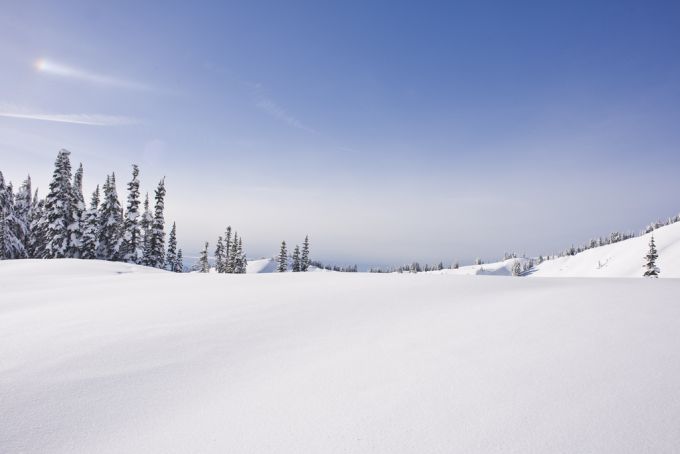
(Credit: Nick Mealey; BY 2.0 Creative Commons License)
(II Kings 21:16a [BSB])
(II Kings 21:2-9; cf. II Chronicles 33:2-9)
(II Chronicles 33:10)
(II Kings 21:11-12)
(II Kings 23:26 [BSB])
(II Kings 24:1-4 [WEB])
(Jeremiah 15:4 [BSB])
(I Kings 14:9a [BSB])
(I Kings 14:22)
(I Kings 16:25)
(I Kings 16:30 [BSB])
(II Kings 21:11a)
(II Kings 21:9b)
(II Chronicles 33:10-13,15-16,19)
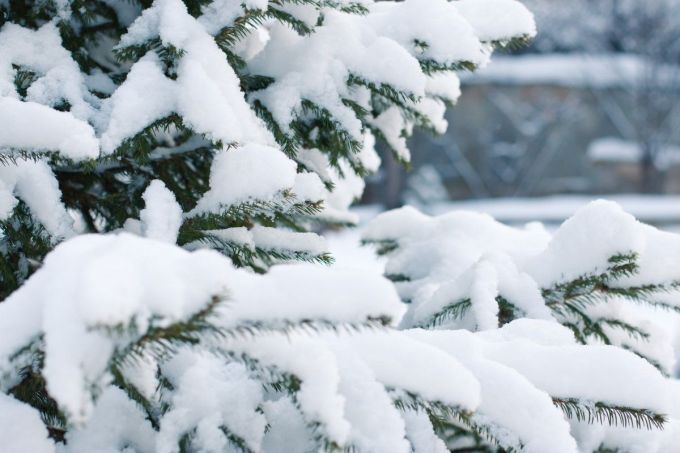
(Credit: PeakPX; CC0 Creative Commons License)
...though your sins are like scarlet, they shall be as white as snow...
It would appear that even Manasseh, perhaps the most wicked man in all of the Bible, was able to find forgiveness and redemption. Not everyone finds that. Manasseh's son didn't find it. Of him the Bible says,
And he did not humble himself before the LORD, as Manasseh his father had humbled himself, but this Amon incurred guilt more and more.
(II Chronicles 33:23)
Not everyone finds forgiveness and redemption. It takes a humble heart willing to submit to God's will. But it is a lesson for us today that it appears that even Manasseh found redemption.
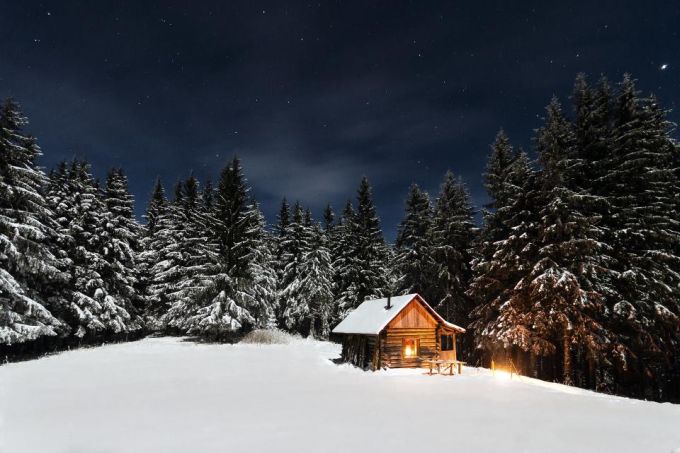
(Photo credit: Paul Itkin; CC0 Creative Commons License)
...though your sins are like scarlet, they shall be as white as snow...
On what may seem like an entirely different subject, but which does relate to it, I'd like to mention this: I was at one time a botanist (that is, a scientist who studies plants), and I did some botanical work in central Mississippi that required some mapping and exploration. One of the things that eventually dawned on me, which seemed very surprising to me at first, is that, contrary to what you might expect, there are very few places in most of the state, especially away from the major river bottoms, where you can get more than a quarter mile away from a house. There are practically no places where you can get more than half a mile from a house. Even if you drive five miles down to the end of a lonely, ill-maintained, country gravel road, usually there is a house 300 or 400 yards through the woods in some direction at the end of another long, lonely road. It's more difficult than you might think to really get far away from traffic where things are totally undisturbed by man for vast areas around you.
I later worked as the botanist in Shenandoah National Park in northern Virginia. Most people who worked there were assigned to certain parts of the Park. As the park botanist, I was one of the few people who could work anywhere in the whole Park. There were a few mountains in the remote south section of the Park where I could go and be reasonably sure that I was the only person on the mountain, with no one else being within perhaps a mile of me. Most mountains, however, often had anywhere from a few people to hundreds of people on them. The Park had to start restricting access to one particular mountain at certain times of the year because, even though it was in a wilderness area and required a strenuous climb to get there, there would often be more than a thousand people on the mountain at any one time.
Running the length of Shenandoah National Park is a high mountain road over 105 miles long called Skyline Drive. It is located very high up in the mountains and runs as nearly as possible along the crest of the mountain chain, with panoramic views sometimes to the east and sometimes to the west. On a very clear day from certain overlooks, you can see (with binoculars) to the east as far as the Washington Monument in Washington, D.C., approximately eighty miles away. To the west you can see with the naked eye five rows of mountains, including the highest peaks in West Virginia.
View from Hazel Mountain Overlook on Skyline Drive; Shenandoah National Park
(Credit: NPS/Neal Lewis; Public domain)
When it snows lightly in the winter, snow plows operate on Skyline Drive to clear the road and try to keep it open for tourists. When it snows more heavily, snow plows clear the road as best they can and as far as they can. If they are not able to completely clear the road, then, instead of allowing tourists in to travel on a snowy or icy mountain road, road crews will close the road and lock the gates behind them.
Snow clearing during the winter on Skyline Drive in Shenandoah National Park
(Credit: NPS; Public domain)
Because of the type of job that I had, I had keys to all the gates. I really enjoyed times when it snowed and the snow plows were able to clear only a portion of the road, but not all of it, and the Park was forced to lock the gates to tourists. I would sometimes take a four-wheel drive vehicle and unlock the gates and work up in the mountains. At times like that, I really was the only person around for miles and miles and miles. That time of year, up in the mountains, it wouldn't be like it was down in the valley. Up in the mountains, there would sometimes be several feet of snow on the ground, and it would be totally pristine and undisturbed and pure and beautiful as far as the eye could see. All the little objects on the forest floor were utterly and completely covered over with snow--not a gray or brown slush like we sometimes see in active parts of the valley a day or two after a snowfall, but pure, undisturbed, and pristinely clean and white.
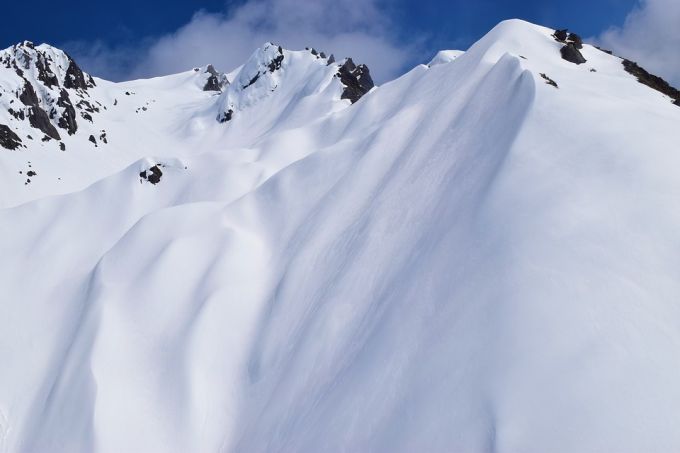
(Credit: Sandy Frew; CC0 Creative Commons License)
...though your sins are like scarlet, they shall be as white as snow...
While living in the Shenandoah Valley down below, we noticed, one evening in late November or early December, that it had begun to snow. We were excited, because it was the first real snow of the year. Before we went to bed, there was about half an inch or an inch of snow on the ground. We were thinking that it would be really nice if we could get another inch or two and make our yard really pretty.
You see, we didn't keep the neatest yard in the world. We were hoping that the snow would cover up some of the imperfections in our yard. We had the garden hose still laying out in the yard, and small kids' toys and dog toys and the dog's food bowl. Plus our dog used the bathroom in the backyard. And, not only that, for some reason three or four other dogs in the neighborhood seemed to think that our backyard was the best place for them to use the bathroom, too. As we went to bed, we were hoping for another inch or two of snow to cover up the garden hose, and the chew toys, and the dog droppings, and make the backyard look nice.
When we woke up the next morning, we looked out to see that, during the night, 28 inches of snow had fallen. In places where it had drifted, it was deeper than that--much deeper in some places. We had a long back yard with some low places in it. We also had a couple of cars parked out back. As we looked out, we realized that we didn't have any idea where the cars were. There were several amorphous lumps out back. We figured that our cars were probably under a couple of them. We finally noticed among the various drifts and mounds in the backyard a single car antenna--the lone indication of where our cars were.
Sometimes we come to God hoping that we might find some shred, some scintilla, some faint portion of mercy that might partially cover up at least some of the dog droppings in our personal lives--not realizing that when God sends a snowstorm of forgiveness, that we won't even be able to find the cars.
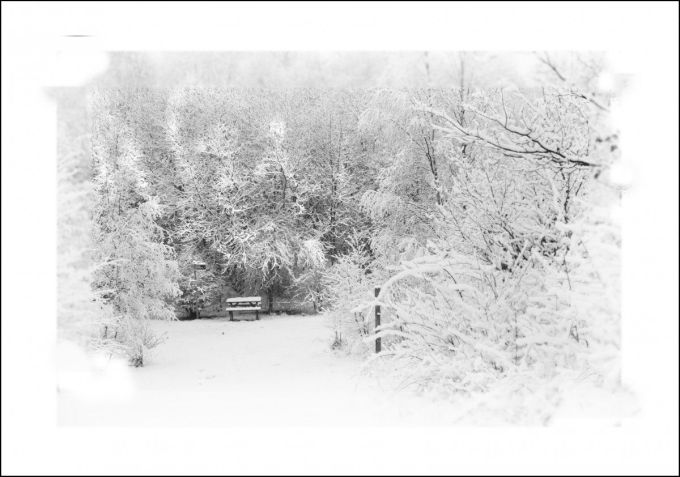
(Credit: Stephen Bowler; BY 2.0 Creative Commons License)
...though your sins are like scarlet, they shall be as white as snow...
With God, forgiveness and redemption can be found even for the worst of the worst if they have a humble and repentant heart...even for King Manasseh...even for me...even for you...even for anyone today.
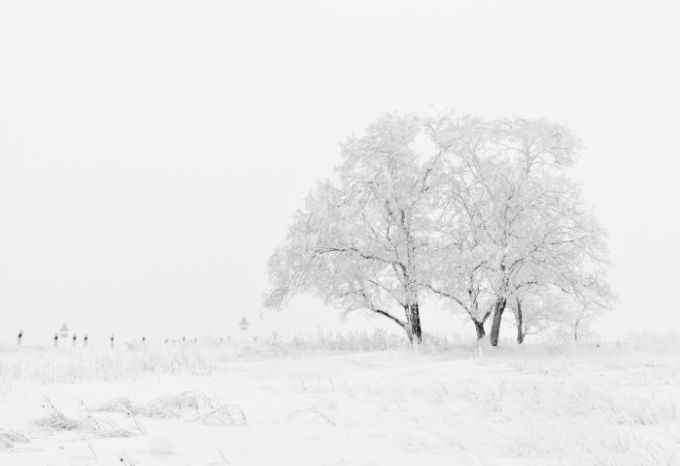
(Credit: Larisa Koshkina; CC0 Creative Commons License)
...though your sins are like scarlet, they shall be as white as snow...